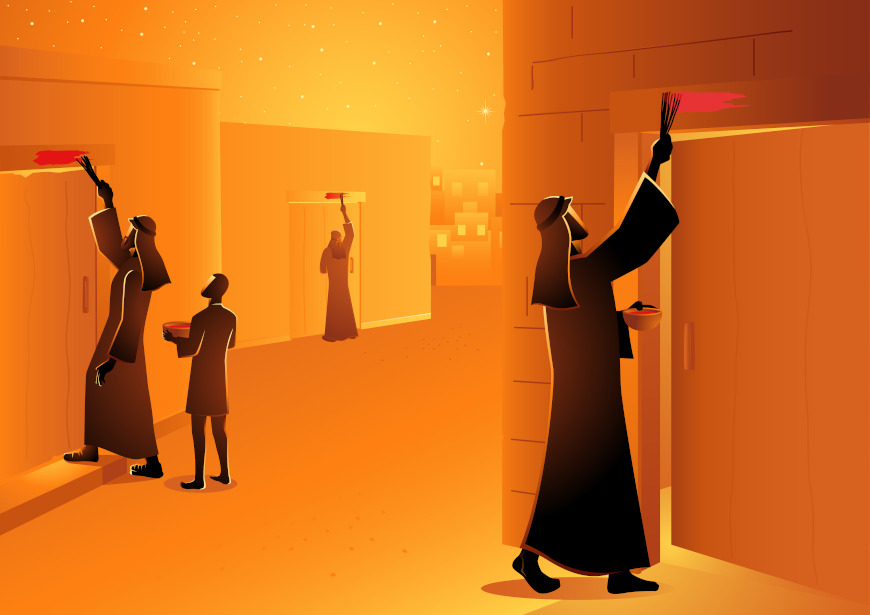
The ten plagues of Egypt are part of a biblical narrative that mentions ten evils sent by God to punish the Egyptians and which resulted in the liberation of the Hebrews.
The ten plagues of Egypt are part of a biblical narrative that is mentioned in the book of Exodus, in the Old Testament of the Bible. This narrative tells the story of the ten plagues that were sent by God to Egypt when Ramses II was pharaoh. These plagues were sent because the Hebrew people were slaves in Egypt, and Pharaoh refused to free them.
The plagues are understood, within the Christian interpretation, as a way for God to demonstrate his superiority in relation to the Egyptian gods, but also a demonstration of mercy, as he could annihilate the Egyptians, but he preferred to punish them with “lesser” punishments. This narrative is considered a myth by historiography.
Summary of the ten plagues of Egypt
- The ten plagues of Egypt are a biblical narrative found in the book of Exodus.
- This narrative talks about God sending ten plagues to punish Egypt.
- The punishment took place because the Israelites were enslaved in Egypt, and the pharaoh refused to free them.
- The leader of the Israelites in the process of liberating these people was Moses.
- Historiography considers this narrative to be a myth, having no basis in factual reality.
What does the biblical narrative say about the ten plagues of Egypt?
The ten plagues of Egypt are a very popular narrative that is part of the Bible, being mentioned in the book of Exodus. These ten plagues consisted of catastrophic events that within the biblical narrative were sent by God against Egypt during the reign of Pharaoh Ramses II. The plagues were a punishment from God , because he demanded that the Israelites be freed from slavery in Egypt, and Pharaoh refused.
The Israelites (Hebrews) were slaves to the Egyptians, and Moses was established by God as the one who would guide these people to freedom. The objective was for the Israelites to be freed to return to Canaan, understood as the promised land of these people, so that they could worship God there . This mission was carried out by Moses with the help of his brother, Aaron.
Pharaoh Ramses II did not accept releasing the Israelites, but when the plagues fell on Egypt, he agreed to their release. However, he changed his position whenever each plague ended. Pharaoh agreed to release the Israelites only in the tenth plague , the most severe of them all.Don’t stop now… There’s more after the advertising 😉
Ten plagues of Egypt in order
The plagues of Egypt were initiated by Moses or Aaron and were intended to punish the region, causing calamity, deaths and suffering to the Egyptians . According to the biblical narrative, the ten plagues were as follows:
- Transformation of water into blood: the waters of the Nile River were transformed into blood, and the beings that lived there died.
- Frogs: the Egyptians suffered from an infestation of frogs that reached the entire land of Egypt.
- Lice: the Egyptians suffered from a large infestation of lice that affected their entire population and also affected the animals of the Egyptian herd.
- Flies: Flies appeared from everywhere, infesting Egypt and bothering the people. The Israelites were not bothered by the swarm of flies.
- Plague and death of animals: Egyptian livestock were affected by diseases that led to their death. The animals raised by the Israelites were not affected or affected by any disease.
- Skin wounds: All Egyptians were affected by large, painful wounds that spread across the entire body. The Israelites were unharmed, suffering no harm.
- Hail: Torrential rains and huge hailstones fell from the sky, causing great destruction and death of people.
- Locusts: A great swarm of locusts passed through the land of Egypt, devouring the crops.
- Darkness: Egypt was plunged into great darkness, which lasted for three days in a row.
- Death of the firstborn: the last and most severe of the plagues determined the death of all the firstborn in Egypt, whether human or animal. The Israelites were spared this plague because they followed an order sent by God to Moses.

What is the meaning of the ten plagues?
The narrative of the plagues of Egypt is understood by Christians as a demonstration of God’s power over the Egyptian gods , who could do nothing to prevent God’s action, according to the biblical narrative. Furthermore, God’s action is understood as a merciful action, because he spared the Egyptians, punishing them in a “mild” way.
Were the ten plagues of Egypt real?
Historians consider that the ten plagues of Egypt were not a real event, and were therefore a myth that was part of the culture and oral narratives told by the Hebrews. Furthermore, there is no historical evidence , other than the biblical narrative, that supports the real existence of this event.
However, many researchers are dedicated to trying to understand the ten plagues and prove whether they were real. There is a theory that suggests that a large volcanic eruption that hit a Greek island around 1600 BC may have caused serious consequences in Egypt and generated effects similar to those of the aforementioned plagues.